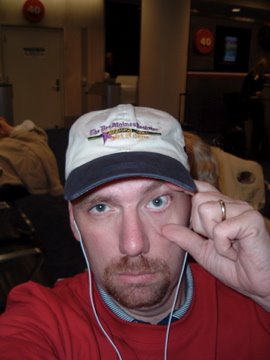A Culture in Denial
After a day of 9/11 rebroadcasts and the inevitable, inane and predictable cable-news questions like "are we safer?", I thirsted for something profound somewhere, anywhere today. Patrick Goldstein of the Los Angeles Times provided it in his examination of the state of popular culture in the five years since the attacks.
In 2001, Goldstein predicted the beginning of the War on Terror would have a sobering effect on a culture that, at the time, regarded Rudy Giuliani as America's Adulterer rather than America's Mayor and elevated the sexploits of then-Rep. Gary Condit to fodder for C-Span discussion. In 2006, Goldstein insists that he was right -- for about a week. But it didn't take long for Americans to relish a return to normalcy thanks to Janet Jackson's breast, John Mark Karr's business-class flight back from Thailand to face "justice" in Colorado, and Tom and Katie's uberbaby.
"In this atmosphere, it's hardly surprising that Sept. 11 has the sound of distant thunder," he argues, "treated with great solemnity but rarely given a thought in our daily lives."
It's not just the fault of audiences, Goldstein says. It's the artistic community's failure to answer creative and existential questions of the tragedy that is a large part of the problem. "We've had authenticity, but precious little poetry," he writes. Even Oliver Stone, the director who alleged massive plotting behind the murder of JFK, was reduced to making what essentially qualified as a Lifetime movie of the week in autering "World Trade Center".
It'll take a long time for us to figure out exactly what 9/11 meant -- especially when we're not interested in wrestling with the big questions that surround the biggest crime of our time.
In 2001, Goldstein predicted the beginning of the War on Terror would have a sobering effect on a culture that, at the time, regarded Rudy Giuliani as America's Adulterer rather than America's Mayor and elevated the sexploits of then-Rep. Gary Condit to fodder for C-Span discussion. In 2006, Goldstein insists that he was right -- for about a week. But it didn't take long for Americans to relish a return to normalcy thanks to Janet Jackson's breast, John Mark Karr's business-class flight back from Thailand to face "justice" in Colorado, and Tom and Katie's uberbaby.
"In this atmosphere, it's hardly surprising that Sept. 11 has the sound of distant thunder," he argues, "treated with great solemnity but rarely given a thought in our daily lives."
It's not just the fault of audiences, Goldstein says. It's the artistic community's failure to answer creative and existential questions of the tragedy that is a large part of the problem. "We've had authenticity, but precious little poetry," he writes. Even Oliver Stone, the director who alleged massive plotting behind the murder of JFK, was reduced to making what essentially qualified as a Lifetime movie of the week in autering "World Trade Center".
It'll take a long time for us to figure out exactly what 9/11 meant -- especially when we're not interested in wrestling with the big questions that surround the biggest crime of our time.

